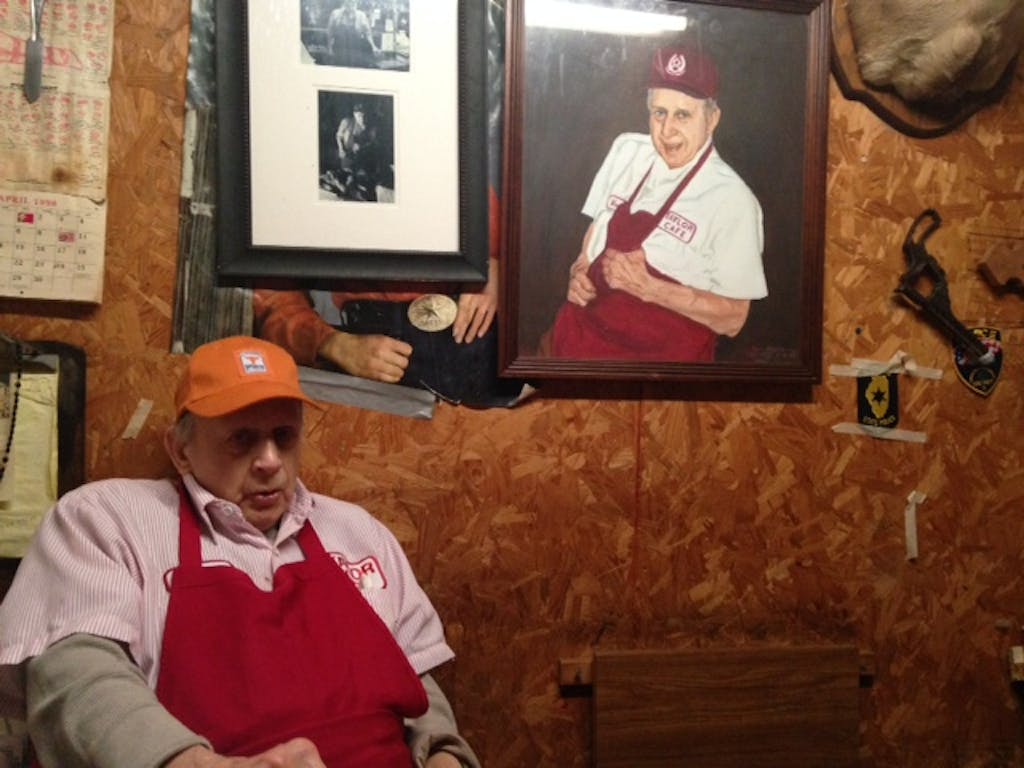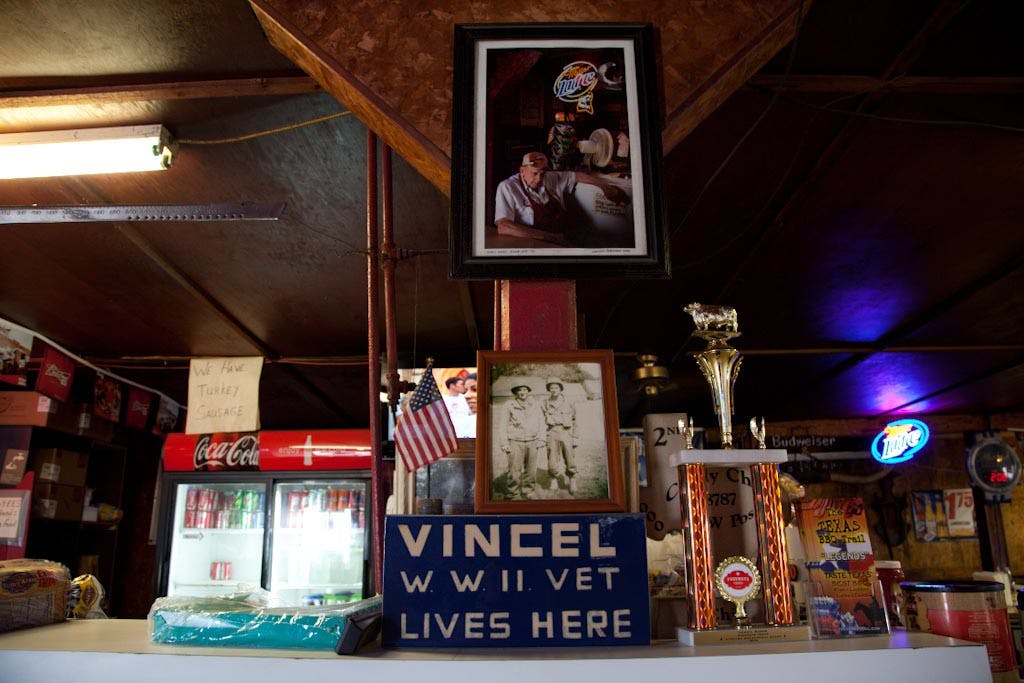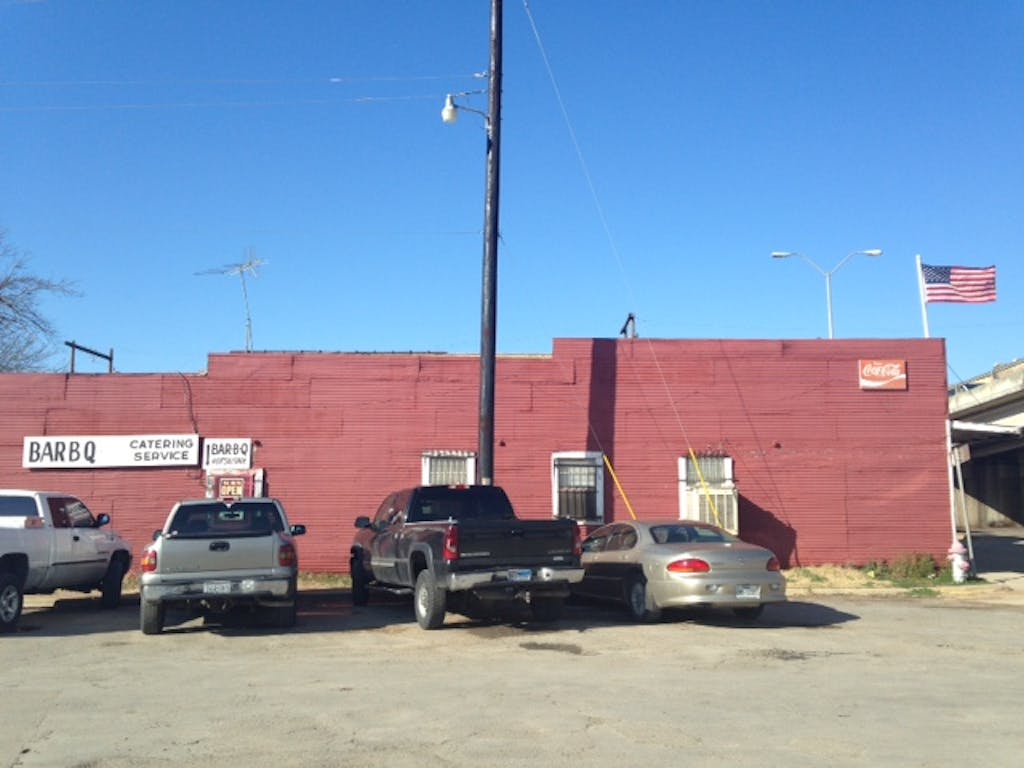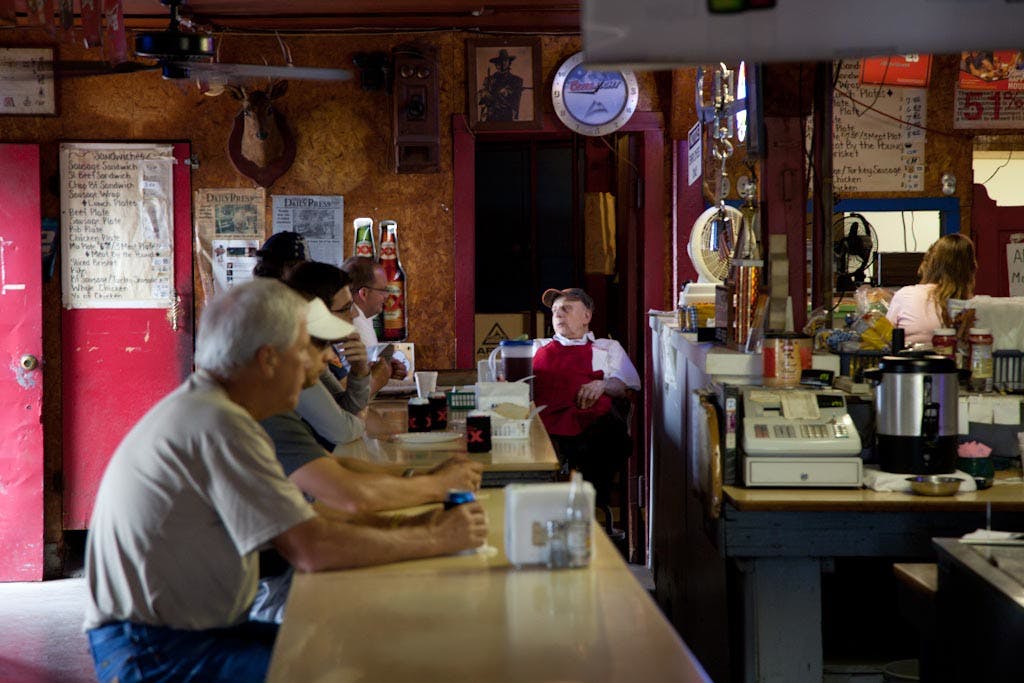
Owner/Pitmaster: Taylor Cafe; opened 1948
Age: 90
Smoker: Wood-fired offset smoker
Wood: Post Oak
Vencil Mares (pronounced like a group of female horses, not the planet) normally sits at the end of the bar just inside the side door of Taylor Cafe. For this interview we went into the only place in the restaurant with air conditioning – Vencil’s office. Even inside the office the train whistle from the tracks running beside the restaurant was deafening, and they happened about every twenty minutes it seemed. A few shelves above the desk were filled with cigar boxes. Vencil said they included all of his financial records, and every box represented a month. He’d need just shy of eight hundred boxes for every month that he’s been open since 1948. For reference on how long that is to be in the same business, Wayne Mueller is the third generation of the Mueller family to run Louie Mueller Barbecue just up the street in Taylor. They started serving barbecue a year after Taylor Cafe opened.
Daniel Vaughn: Where were you born?
Vencil Mares: I was born in Cistern, Texas. Actually it was Kovar in Fayette County. I went to school in Flatonia. When I was sixteen I volunteered for the service.
DV: Was that legal to volunteer so early?
VM: My daddy and mother had to sign for me. On May 2, 1943 I joined the Army. They sent me from Fort Sam Houston to California where I had my basic training. We went out to Needles, California for desert training. From there we shipped out on the troop train to New York. We had a big convoy going overseas to prepare for the invasion of Normandy. We had to wait until we had a boat load of troops. We got on the ship and we had to go around the back end because there were too many German submarines. We landed in Liverpool. Then we disbursed to private houses to stay.
DV: You didn’t have any barracks to stay in?
VM: No. We had to have so many people for the invasion of Normandy. We stayed in those houses until they had things set up for us. The invasion was supposed to be June 2nd, but the weather got bad. We had to wait until the 6th of June. We were waiting on this side of the channel until we were ready to go. The invasion was successful, but we lost a lot of men. We got on and whooped them up on the back. We landed and started putting up our canvas tents to treat the patients.

DV: You were a medic, right?
VM: Yes sir. I patched them up the best I could to get them to the surgical department. The ones that were real bad they just flew them straight on a helicopter to Wales. They had a big VA Hospital there.
DV: You must have seen some awful injuries.
VM: Oh yes. That medic job was a twenty-four hour shift. You had to stay on your toes. There was no eight hours about it. You did as much as you could and you stayed with those troops in the tent. You slept on the ground or in a sleeping bag.
DV: You just caught some sleep whenever you could?
VM: Uh huh. I met my brother over in France at Brest Navy base. He was driving an ambulance bringing in soldiers into our hospital. That how he we met. He found out where my outfit was and he had some wounded soldiers in his ambulance, so he brought him to the hospital where I was at.
DV: How far into Europe did you get?
VM: We kept pushing them back, but at every hedge row they had a machine gun set up. We called in the Air Force who came and bombed every crossroad. We kept pushing them back all the way to Paris. Then we got to go through the Arc de Triomphe.
DV: How long were you in Europe?
VM: We stayed until the end, until the war was over. We were replaced at the hospital. We left and I got home for Christmas in 1945.
Vencil then talked about the end of his time in Europe. He was in Luxemburg City during the Battle of the Bulge. He credits the German tanks running out of gas for halting their advance.
VM: Then we shipped home. It took us four or five weeks to get home. The ship took five days to get to Virginia. They disbursed us from there. One train went to New York, another to Washington D.C., and one to Houston. I got off in Tyler, Texas which is where I got my discharge. December 24th at 9:00 that morning. I got to Houston by 1:00 and took a train from there to Flatonia. It wasn’t too far from my house. About thirteen miles. So I hopped of when they passed the city limits and walked through the woods. I didn’t know anyone with a telephone and I wanted to get home. I made it to Highway 95 and I saw a car coming. I wanted a ride, so I set my satchel down and backed up. The car stopped and he said “where are you going soldier?” I said “I’m going to Cistern, Texas.” He said “you know what? I’m going there too.”
DV: Did you know the man?
VM: We went about two blocks and I realized it was my brother. The same one I saw in France. He was coming home for Christmas too. My own brother.
DV: You didn’t recognize him?
VM: Not right away. It didn’t dawn on me. I didn’t expect it. It was still dark. We got home for Christmas together.
DV: You being a medic in the Army, did you consider becoming a doctor?
VM: I didn’t have that schooling and I didn’t know those big words. I liked cattle. My daddy had about five hundred head back home.
DV: And home back then was still in Kovar?
VM: That’s right. Fayette County.
DV: Is that where your parents were born?
VM: Yes. I don’t know about their parents though.
DV: Are you of Czech heritage?
VM: Well, I don’t know. I’m somewhere between an [unintelligible] and a billy goat. Way back there we suspect there’s a bit of Australian in me. That’s what they tell. I guess there’s some Bohemian and Czech too. [Through some research I discovered some family history. Vencil’s paternal grandfather Josef Mares was from Bohemia and his paternal grandmother Anna (Yunek) Mares was from Czechoslovkia. His maternal great-grandparents were also Bohemian, but I didn’t find any Australian in his lineage.]
Vencil Lives Here from Foodways Texas on Vimeo.
DV: What did your father do?
VM: My dad was a cattle man. I helped him with ranching. When I came back in 1945 I stayed at home for a couple weeks. Then I went to find a job and started work at Southside Market in January.
DV: So it was pretty soon after you got back from the war that you started at Southside?
VM: I didn’t have to, but I did. I couldn’t stand around looking at the wall. I had to keep myself doing something.
DV: There wasn’t any work for you on the family ranch?
VM: Not enough. I had two other brothers who were both in the service too.
DV: What did Southside Market look like back then?
VM: It was downtown across the tracks.
DV: What was your job when you started?
VM: I was cutting meat, grinding meat for chili, and making sausage. I cooked barbecue back then too.
DV: Do you remember what meats you cooked there?
VM: Beef ribs, pork ribs, chicken and sausage. I was working there and thought I might as well go out on my own.
DV: How did you raise the money to start this place?
VM: I sent all my money home from the war. You hardly made anything in the Army. As a private I made $32 a month. I spent $5 of that on toothpaste and shaving stuff. I finally pushed my rank up two notches and got it up to $72 a month. I sent it all home so I had about $4000 saved when I got home.
DV: What did they pay you at Southside Market?
VM: $25 a week.
DV: That’s about $100 a month. That’s better than the Army.
VM: Yeah, but I had to feed myself and take care of my own clothes.
DV: Who was the owner back then?
VM: Mr. Stach. Jerry Stach.
DV: Did he teach you how to barbecue?
VM: Yes.
DV: Had you ever done barbecue before?
VM: No. Hell, I joined the Army when I was sixteen. That’s the only thing I did. I had just turned 21 when I came home on the boat.
DV: Then you bought this place. Was that in 1948?
VM: I took the money I saved and bought this with it.
DV: How much did you pay for it?
VM: I bought the first building and then the one next to it. It was $3700 altogether.

DV: Who did you buy it from?
VM: Mr. Schram. He was a state representative. This used to be an old motel for the railroad fellas. It was two stories, but the top story burned off. They cleaned it all up before I bought it. I built the pit myself.
DV: Did you move to Taylor when you opened up?
VM: Yes. I rented an apartment.
DV: Taylor was a big hub for cotton pickers back then. How many other barbecue joints were in town then?
VM: A lot. Maybe twelve or thirteen.
DV: Were they mostly inside grocery stores like the way Louie Mueller was?
VM: Yes. That’s right. Louie Mueller started over on the other side of the tracks. It was an old Red & White grocery store.
DV: What did the town look like back then during the cotton harvest?
VM: It looked like Mexico City. It was wall to wall people in here.
DV: And there were lots of fights at Taylor Cafe?
VM: Oh yeah. I broke up a few. When those boys would take out a knife I’d tell them to put it away. I’d tell them if they went to jail the city would be getting all their beer money, so they better not start it. That usually took care of it.
DV: How long was the cotton picking season?
VM: July and August. That’s when the cotton bulbs were ready. They’d burst open in the heat.
DV: When you first opened up, what did you serve?
VM: Well, I was serving sausage – beef sausage. I did chicken, briskets, beef ribs, pork ribs…
DV: You were cooking specifically briskets back in 1948?
VM: Well, I guess we didn’t cook just briskets. We did beef off the forequarters. The chuck seven, beef ribs, and stuff like that.
DV: Did you get in a full forequarter and break it down here?
VM: Oh yeah. I knew how to do that from working at Southside.
DV: Do you remember when you switched over to doing just brisket?
VM: I don’t really remember. It wasn’t until you could order them.
DV: How much were they when you first started ordering them?
VM: Thirty-nine cents a pound.
DV: When did you add the turkey sausage?
VM: Just about ten years ago.
DV: And the beef sausage is all beef?
VM: Yes. We’d cook the briskets, but we’d get in whole carcasses of old bull meat. We’d break that down and make sausage with it.
Video interview from the Southern Foodways Alliance.
DV: Is there any pork in your sausage these days?
VM: A little. Just whatever we trim off the pork ribs. We add in all the trim from the briskets too.
DV: Do you trim off a lot of fat from your briskets?
VM: I leave some fat on there. You cook them with the fat side up. If you go fat side down all the seasoning will run out of it. I season them the night before they go on the pit. That seasoning seeps in. You don’t want to cut that fat off then when you slice it because that’s where all the seasoning is; all the flavor. If you cut off all the fat then you throw all that seasoning in the trash.
DV: How long do they cook?
VM: A good size brisket, say eight or nine pounds, will cook in about six hours. Then they finish cooking overnight. The health department man made me get an electric warmer to keep them overnight.
DV: Last time I was here you had those igloo coolers that you kept them in overnight.
VM: It was about two weeks ago. The health department said I couldn’t do it that way anymore. He said it wasn’t safe.
DV: After how many years? Did you argue with him?
VM: No. What can you say? They have all the power. You just have to do it or they’ll shut you down. I just went and bought those electric warmers.
DV: What time do you start your day?
VM: I get up at five in the morning. I’m here before six. That’s every day.
DV: Do you still eat barbecue here.
VM: No. I mean I eat a nibble here and there to make sure it’s all good, but not much.
DV: Earlier this month you made your Super Bowl debut. What was the experience like filming a Super Bowl commercial?
VM: It looked like it was alright as far as I could see.
Check the 0:25 mark in the video above
DV: Did they cause you any trouble being in here?
VM: I was just sitting up there where I’ve been sitting. They didn’t bug me. They filmed alright, and of course they paid me.
DV: Did you have to close down for the filming?
VM: No.
DV: What has the reaction been like since it aired?
VM: I had people call me from different places and tell me saying they saw me on T.V. I was kinda proud of that. I guess a lot of people know me.
DV: Did you ever imagine you’d be on a commercial seen my millions and millions of people?
VM: [Laughing] No. Not in my lifetime. That was a first. I’m in these magazines and on the internet. I ask people how they found me and they say it’s a magazine or a website. I get a lot of people here from different countries. I get people from Sweden, Germany. About two years ago a whole family from Russia came. They come from France and Belgium.

DV: You have that perch there at the end of the bar which is where you’ve been sitting every time I’ve come in. Do you imagine you’ll be sitting there as long as you’re around?
VM: I guess. I can see right there down the line. Y’all think I’m blind, but a one eyed Jack can still see. If you serve a beer I wanna see who’s paying for it.
DV: Do you have any kids who might be interested in running the place when you can’t anymore?
VM: No. I have a son Steven over near Austin. He was a football and baseball coach, but he’s retired from that.
DV: How long has Scott Morales been working with you?
VM: Four or five years now. He gets down here in the morning and gets everything cooking. He cooks the ribs and sausage. The brisket is already ready. At about twelve o’clock we’ve got everything done.
DV: Do you think Scott might be the one to take over when you’re through?
VM: I don’t know.
DV: Have you ever thought about it?
VM: Well, you always think about it. You have to do what you gotta do when you get old.
For more information be sure to see Vencil’s oral history from the good folks at the Southern Foodways Alliance.







